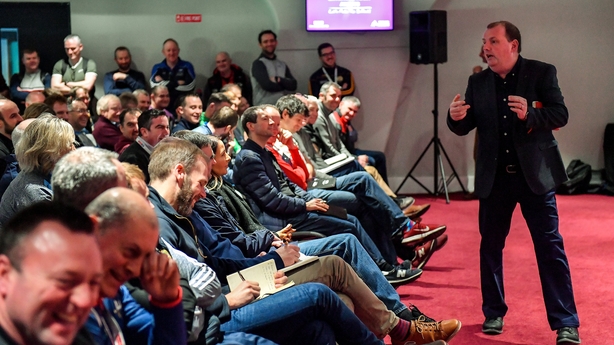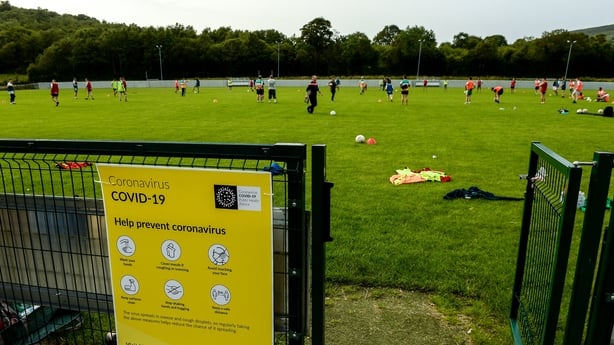Inter-county players have retired in droves over the past week.
Between the Kerry and Mayo senior football panels alone, seven players have left the respective panels in the past number of days.
Around the country the likes of Denis Booth from Laois, Meath's Graham Reilly, Down’s Conor Maginn and Roscommon’s Donie Shine have all left the stage.
Before Christmas, Cork’s Paul Kerrigan set the ball rolling by stepping aside. His county colleague and former Rebel senior hurling captain Stephen McDonell retired yesterday following in the footsteps of Galway 'keeper James Skehill and just a few weeks before him, Tipperary defender Sean O’Brien.
Some would see this as business as usual, an annual turning of the wheel. There is, after all, a natural order to these things.
Age, lack of game time, niggling injuries and slips down the pecking order all contribute to players walking away.
Maybe it is the fact that so many have quit at once – seven Mayo and Kerry players in six days, or maybe it is surprise that they have done so with the 2021 season just weeks away, that has caught the attention this time around.

Cork’s Under-20 All Ireland-winning team manager & CIT GAA Officer Keith Ricken wouldn’t for one second attempt to second guess any player’s reasoning for walking off into the sunset, but on a broader level, having worked with countless gifted young players coming through the underage third-level systems, he has gleaned a clear insight in this area.
In 2019, Ricken managed Cork to a splendid Under-20 win, coming back from seven points down to beat Tyrone in the semi-final. Later that season he also coached the Carrigtwohill senior hurling team that reached the Cork semi-final against the odds as that same team.
Not only had it been eight years since they reached that stage of the competition but the team that hadn’t previously won a first or second round Championship match since 2015. Indeed, they had been hammered by St. Finbarr’s in the first round of the 2018 championship by 24 points.
Part of Ricken’s secret is stripping away the nonsense and getting the best out of people. He is a renowned man-manager whose natural ability to communicate and help others stand him apart.
"When they are asked 'who are you?' they should respond that they are brothers, uncles, boyfriends, part-time workers – that they are many things'. "But mostly they reply they’re athletes"
In his role as GAA Officer at CIT, he sees players develop on and off the field. With so many retiring from the top level this past week, he is well-placed to offer a view on the ever-changing landscape that an inter-county player must navigate, from development squads right through to senior panels.
"Firstly, I couldn’t make comment on why any of those lads who left this week did so," he says. "They all have their own reasons.
"But maybe there were bigger issues at play this time. One of the things that the lockdowns have brought is perspective. Players now realise what’s really important and want to devote their time to that.
"Most of these lads have had no break in 15 years since they started in academies. They took no gap year. They were immersed in GAA.
"In North America, a study was done showing how athletes struggle with their own identity from their mid-20s onwards. Identity foreclosure, they call it. They don’t see themselves as a student, brother, boyfriend, girlfriend, partner, whatever.
"They solely view themselves as athletes.
"When they are asked ‘who are you?’ they should respond that they are brothers, uncles, boyfriends, part-time workers – that they are many things.
"But mostly they reply they’re athletes. And that can lead to them losing their identity very early on."
Ricken wonders whether the events of last year, with the country being locked down on a number of occasions, made many inter-county players think twice about committing again.
"This time they were not even able access training sessions, they had to go out on their own, do zoom calls, they were restricted to within 5km of their homes for a while and they couldn’t even go down to their home pitches for a period either.
"A lot of that time they may have been training away on their own. That would only lead to them having a lot of time to think. And they may wonder, ‘why am I doing all of this? What’s this all about?’"

The CIT administrator feels that 2020 gave many players the chance to exploring who they really were.
"There may well have been an awakening as regards how much they were giving up to play hurling and football and may then have clearly seen for the first time other things they had missed out on."
As the first lockdown ended, Ricken witnessed guys returning to training in various panels and realised how some missed training and playing so much that really upped the ante upon their return.
Equally, though, he also noticed players coming back who had lost a bit of lustre for it all throughout lockdown, having seen life outside the bubble.
"Even at club level I was observing that stuff," he says. "Some really missed it but on the flip side some guys discovered that it was not the be-all and end-all. That there were other things in the world.
"With so many inter-county retirements, you come to your thirties and maybe you really start to examine what you really want to do in life.
"Maybe playing inter-county has delayed that because they have been so immersed in prioritising being an elite athlete.
"Now the question arises, especially if lads are at an age, injured, not getting games or whatever – where am I going?"
Having been steeped in the GAA as a player and coach, as well as helping many students who passed through the corridors at CIT, Ricken has an innate understanding of how players think.
He feels that carrying and meeting the expectations of everyone else will eventually lead to weariness.
"Everyone feels they should be on the team, winning All-Irelands and they should be on top of their game," he says.
"That’s fine. Even if I’m 36, I know I will be slower than a team-mate who is 24 but I know I will bring my own experience.
"Does everyone in a set-up see it like that? Some don’t. The modern GAA world is all about comparisons. Physical appearances are compared, fitness levels, even looks. People are constantly looking to or talking about a new model coming through.
"Very few opening conversations to a GAA player after the weekend begin with a query about their family. It's always back to the most recent performance"
"And maybe some of the lads who retire would rather be missed than dismissed.
"They are heading out into sunset on their own terms. Look at it from their point of view - they have been brought up trying to please people.
"Everything along the way has been about performance, being compared to the next guy.
"How did you play at the weekend? Did you score? Did your man score?
"Very few opening conversations to a GAA player after the weekend begin with a query about their family. It’s always back to the most recent performance.
"That’s not easy for them. In the last number of years counties have brought in all these experts to their set ups. Trying to add value.
"That only leads to more comparisons, fitness tests, scores, it’s all done by comparison."Ricken feels that there is very little value lent to experience these days.
"In CIT, most guys come down the hill to me to go training on the pitches and I wonder how many of them lads actually know about themselves.
"They can tell me everything about a TV show, or who the Tyrone wing-back is and how he plays, but what can they tell me about themselves?
"What are their strengths?"
The Cork under-20 boss feels that more experienced players have, at the very least, a huge role to play in helping young players get perspective on the whole set-up.
"In the last steps of the Alcohol Anonymous recovery programme the recovering person is told that they must pass on lessons to someone else, go and help someone else or otherwise their recovery has not been a gift because they haven't given anything back.
"They say that it’s only a gift when that person puts someone else through the process," Ricken adds.
"It would be the same in some inter-county set ups," he reckons. "The contribution of older players may not be appreciated enough. Through the past couple of decades managers come in and wipe out everyone, lads are gone.
"But so too is all that 'old information and experience’ And you can’t buy that," he says.
He points to his time with the Carrigtwohill hurlers when they relied on veterans like Seanie Farrell and Niall McCarthy to get them across the line on occasion in 2019.
"Those two owe no-one nothing but they delivered the goods. Men win championship matches for you," he says.
"Personally, I think some of us really only have the games cracked as they hit 30 as regards fully understanding positioning, timing, runs, and all the tactics that go with it.
"There is always something that you can improve. The really good inter-county players will know himself when his time is up and that’s when he has too many things to improve on."


